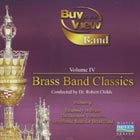 Brass Band Classics Volume IV
Brass Band Classics Volume IV
13-Apr-2006
Buy As You View Band
Conductor: Dr. Robert Childs
Doyen Recordings: DOYCD201
Total Playing Time: 67.00
This release is the fourth, and last of what has been a very enjoyable and quite personal series from Robert Childs and his band.
Not only is that something of a disappointment, but so too are certain aspects of the post production process on the release which certainly do not match the quality of the performances on offer of some great old war horse test pieces.
The six pieces selected are a great mix: Pageantry, Rhapsody in Brass, The Belmont Variations, Freedom, The Frogs of Aristophanes and Symphonic Suite for Brass Band are performed with a real panache from the band in typically expansive but detailed readings from the MD.
Unfortunately there is a somewhat noticeably uneven feel to the quality of the individual recordings that manifests itself in a couple of the test pieces with imbalance and a rather deadened acoustic, whilst there are also a couple of examples where the editing process lacks a sense of continuity.
Although that doesn't detract too much from the performances themselves, it does give the Lucas Symphonic Suite and Bath's Freedom in particular a strangely indistinct feel and lack of acoustic clarity.
What is disappointing though is the quality of the sleeve notes, which are completely underdeveloped, lack narrative detail and are error strewn. It is a great pity, as they have enhanced previous releases in the series forming an integral part of the appreciation of the release as a whole.
Back to the playing and Pageantry, which is given a wonderfully rich and exciting performance. The opening King's Herald is superbly detail and controlled with the right sense of chivalry, whilst the Cortege displays a fine elegance and just the correct touch of sombre darkness. The final Jousts is a bit of a tour de force from the cracking opening cornet fanfare right through to an almost viciously exciting close.
Rhapsody in Brass is also paid appropriate homage with a performance that has a fine sense of cultured appreciation. The MD lays out the full beauty of the score in such an expansive manner that immediately captures your attention. The tempos are spot on – allowing for the detail and balance to come through in the opening and closing sections, yet allowing the lovely middle movement to flow with a rich musical viscosity. It is a lovely understated reading.
The Belmont Variations remain something of a brass band curiosity; a chamber piece for brass that somehow cannot be easily pigeon holed in style to anything written since. It is clever, dry and academic, a technical piece of brass composition that somehow never quite tugs at the heart strings. Perhaps the birthplace of Sir Arthur's wife in Massachusetts was a waspish home of refinement and good manners, for it is a piece that has no real heart and soul.
BAYV deliver it in almost perfect manner; clean and detailed, almost antiseptically in many of the technical variations, whilst the famous, but totally misplaced triple cadenza for cornet, euphonium and trombone is stunningly played. It is a classic performance of an icy somewhat heartless piece.
That cannot be said of Freedom, with it delicious themes of romance, humour and nature. Bath's tour de force is still a crackerjack of a piece to play and play well, with its immense technical challenges for sections of a band that don't usually get treated in such a manner.
It is now a very dated musical style, but given such an intelligent approach as displayed here it still has plenty of life in the old bones and a real sense of romanticism, wit and feral beauty. Even if the acoustic on this recording isn't quite as crystal clear as elsewhere, it does show off the strengths of BAYV to the full in a ripper of a performance.
The Frogs of Aristophanes really is a classic of its genre – a genre that was perhaps the soul preserve of one man – Granville Bantock. His desire to bring Greek tragedy to the musical brass band masses (The little amphibians do not belong to Aristophanes, but are a central part of his story concerning the decline of tragic art; the frogs of the Acherusian lake greet the hero Aeschylus in a croaking chorus as he makes his way to the lower world) was something of a personal crusade it seems. It is both a dark yet humorous story and is brought wonderfully to life with real warmth.
Finally, something of a hidden gem from Leighton Lucas and his Symphonic Suite for Brass Band. Since it was written nearly fifty years ago it has only occasionally surfaced, most latterly as the test piece for the Second Section Regional Championships in 1999.
It is a wonderful piece, from the drive of the underpinning ground bass theme in the opening Toccata to the Iberian feel of the Aria and real joivre de vivre of the Fugue a la Gigue. Lucas himself remains something of an enigmatic figure in the banding movement (in spite of his short tenure as professional conductor at Black Dyke in 1962), and his composition fits that description of him to a tee.
It rounds off a most enjoyable series from BAYV and Robert Childs that has blown the dust off many yellowing classics of the bandroom library and given them a real injection of contemporary lifeblood.
Iwan Fox
What's on this CD?
1. Pageantry — Suite for Brass Band, Herbert Howells, 13.16
2. Rhapsody in Brass, Dean Goffin, 11.09
3. The Belmont Variations, Arthur Bliss, 11.19
4. Freedom — Brass Band Symphony No.1, Hubert Bath, 10.54
5. The Frogs of Aristophanes, Granville Bantock, 9.02
6. Symphonic Suite for Brass Band, Leighton Lucas, 11.19
Total Playing Time: 67.00









